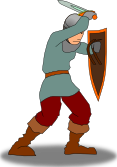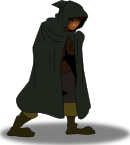Mano a Mano:Occupations
Occupations[edit]
Occupations describe what a character does: how the character makes a living and fits into society. Sometimes occupations are professions, careers, jobs or businesses, but volunteer work, hobbies and even crime can also be occupations. An occupation should include a description, at least one advantage and at least one requirement. Occupations can also have liabilities: effects which are not advantages. A game's list of occupations should balance the advantages and requirements of each occupation. Occupations can provide character development opportunities during the game. Characters can change occupations and have more than one occupation at the same time, as long as they meet the occupation's requirements and the game or GM allows it.
Description[edit]
Give the name of the occupation, what it's practitioners are called, and special terms for the occupation's activities. Explain what characters do in this occupation. Indicate the setting, culture, communities, nations, or worlds where this occupation is found, and how the occupation relates to them. Describe the organization of the profession: societies, traditions, rituals, competition, initiation, apprenticeships, status, reputation, etc. Explain how characters training for this occupation develop the requirements.
Requirements[edit]
Most occupations require minimum ability modifiers in one or more specific abilities. This reflects the training and education required by the occupation. An occupation may also require the character to have another occupation, or to have had that occupation in the past. This may indicate professional experience or rank. Occupations might require other specific accomplishments - things the character must do before acquiring the occupation. For example, a character might have to win a competition, or spend a certain amount of money.
Opportunities to acquire the occupation can be limited. Some occupations require the character to be elected or appointed. If there are a strictly limited number of positions available, a character may be unable to acquire the occupation until there is a vacancy. For example, a kingdom usually has only one king at a time.
Occupations might discriminate against certain types of characters. The occupation may not be allowed for characters of a particular template, sex, age, culture, social class or political alignment. If the occupation is allowed but significantly less compatible or popular with certain types of characters, explain why. (Or explain why the occupation is particularly popular or compatible with certain types of characters.) The occupation might also depend on the character's social connections, reputation or popularity, or the occupation might only be available as an inherited position.
Advantages[edit]
The advantages of having an occupation can include income, opportunities, status and privileges. An occupation can also improve or hurt a character's reputation. A better reputation is an advantage, but a worse reputation is a liability. The list of equipment required by an occupation is considered an advantage. When a character acquires the occupation, they receive this equipment if they don't already have it. An occupation's equipment list will often include multiple choices. If the character must invest a substantial amount of their own money to get this equipment, that cost might be a requirement of the occupation.
Liabilities[edit]
Occupations can require time commitments. They may limit how many other occupations the character can have. An occupation may even prevent the character from having any other occupations. Occupations can include duties which require a character to do certain things. An occupation can have standards of conduct and penalties for not keeping the occupation's rules. A character's reputation can be adversely affected by an unpopular or notorious occupation.
Occupation Examples[edit]
In this example each item is worth it's CP value in small silver coins.
If a character meets both of these occupation's requirements they may begin as either a Robber or Knight. If this character begins as a Robber, but gains the reputation of being a hero who is loyal to the king, and if he ceases to take advantage of his robber privileges, the King may choose to give this character the occupation of Knight. If this character begins as a knight, but proves himself disloyal to the king by participating in unlawful activity, he has the option of becoming a Robber, but loses all of his Knight privileges.
Consider two characters who are identical except that one character is a Knight and the other character is a Robber. The Knight has an advantage over the Robber, but the Knight also has stricter requirements.

